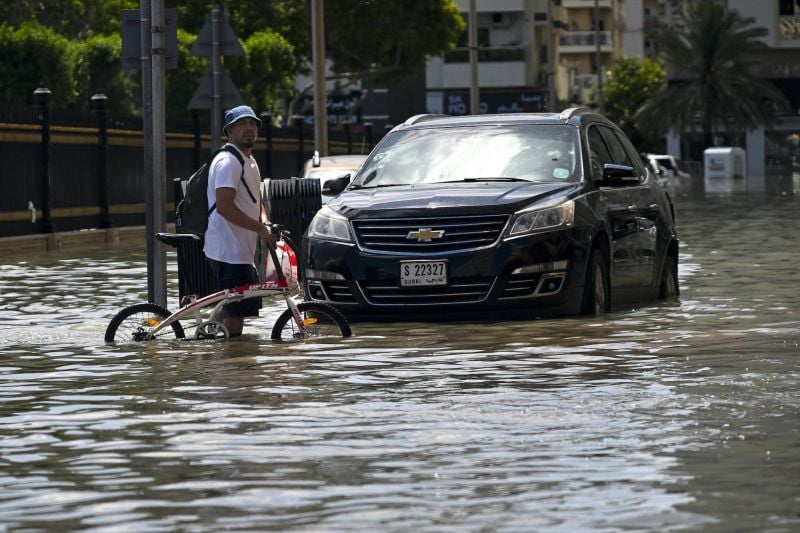
A man crosses a flooded street following heavy rains in Sharjah on April 17, 2024. (Credit: Ahmed Ramazan/AFP)
BEIRUT — Abeer Malaeb, who manages an electricity supplies company with her husband in Aley, flew to Dubai Monday night to attend the Middle East Energy conference.
There, she and her husband hoped to mingle with the more than 1,000 “energy exhibitors” from around the world, according to the conference’s website.
But then after she arrived, on Monday night and into Tuesday morning, more than a year’s worth of rain hit the UAE while she and her husband slept in their hotel room.
The rare heavy rainstorm battered the UAE, unleashing strong winds, flooding major highways and disrupting flights at the otherwise busy Dubai International Airport — in what state media described as the largest amount of rainfall in the past 75 years. At least one person died in the flooding in Ras al-Khaimah, one of the country’s seven emirates, according to police.
The rains surpassed “anything documented since the start of data collection in 1949,” the state-run WAM news agency reported.
The rains began on Monday night, and by Tuesday evening, more than 142mm (5.59in) had soaked the desert city of Dubai. This is typically the average rainfall for a year and a half, according to World Bank statistics.
Malaeb says she woke up in her hotel Tuesday morning to chaos.
“We did not know the size of the storm. We saw streets drowned with water. People were stuck in their cars because of the water, some were barefoot on the streets. Cars stuck on highways. We are on a fancy street and still, it is the case,” Malaeb tells L’Orient Today.
She and her husband managed to arrive at the conference on time because they were staying in a hotel nearby — only to find that the international event had been canceled due to the storm.
“The hotel we are staying in has water dripping [inside] and the electricity was off for 30 minutes at some point. Every restaurant we ate at had water dripping,” Malaeb says.
“There are no taxis and the metro is barely functioning,”
Videos shared on social media showed a scene of Dubai International Airport — recently labeled the second busiest in the world — underwater as a plane tried to go through floodwater. Large jets looked more like boats moving through the flooded airport while indoors, the terminals were inundated with rain.
As of Wednesday evening, the airport’s website still shows a significant number of departers and arrivals canceled in red lettering.
"We are working hard to recover operations as quickly as possible in very challenging conditions," the airport posted on X.
Delayed by two crises
Nour Jaber, a Lebanese woman living in Dubai, came back home to Lebanon for Eid al-Fitr.
Her return flight to Dubai was canceled not once, but twice.
“I came for the Eid break, and I was supposed to leave on the 14th of April, the 2 a.m. flight. I planned to reach Dubai on Sunday morning and have a good rest before Monday and the start of the week,” Jaber says.
Then came Saturday, when Iran sent a salvo of drones and missiles across Middle Eastern airspace to Israel, shutting down airports across the region. Jaber’s flight, like thousands of others, was canceled.So she booked a new flight back to Dubai for Tuesday.
“I was frustrated at the beginning and then I thought that it wouldn't help me get anywhere, so let me enjoy my time here [in Lebanon] with my family,” she says.
Jaber is still in Lebanon as of Wednesday.
Floods in Lebanon are regular as its poorly maintained infrastructure, which has faced a lack of investment since the 2019 economic crisis, struggles to cope with large bursts of rainwater. This past winter saw a stretch of highway and shops in Beirut inundated as the nearby Beirut River overflowed amid storms.
Lebanon’s numerous crises have pushed citizens abroad to Dubai in droves.
Widad Taleb is among them. She was back from a trip to Turkey on Tuesday and had a layover in Doha along the way. Her final flight back to Dubai — just a one-hour trip — was postponed until Wednesday and then again until Thursday.
“I don’t even know if we are flying tomorrow,” she tells L'Orient Today. She is now staying in a hotel in Doha.
“Generally when it rains in Dubai we are advised to stay indoors and we work from home but this time it is way more intense,” Taleb says.”
“What worries me more is people who are stuck in the cars, and those who are injured,” she adds.
Taleb says that the floods remind her of winter flooding in Lebanon, where rain inundated highways and businesses in recent months. Still, says there is “no comparison” to the situation in Lebanon.
“Dubai gave the world the perfect image of the modern and future city,” says Jaber, who is still stuck in Lebanon. “But working in the architecture field, I saw how bad the construction is, as well as infrastructure.”
“In Lebanon, we know the negligence, but in a country like UAE that all the world looks at, they should’ve worked more on their infrastructure.”
The Dubai government’s media office posted on X on Wednesday ordering schools to continue teaching classes online as emergency workers cleared debris from the streets.